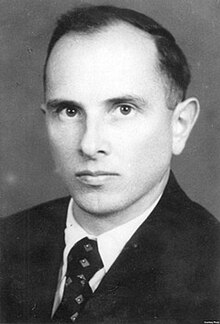
Back Stepan Bandera ALS ستيبان بانديرا Arabic ستيبان بانديرا ARZ Stepan Bandera AST Stepan Bandera AZ Stepans Bandera BAT-SMG Сцяпан Андрэевіч Бандэра BE Сьцяпан Бандэра BE-X-OLD Степан Бандера Bulgarian Stepan Bandera BR
Stepan Bandera | |
|---|---|
Степан Бандера | |
 Bandera, c. 1934 | |
| Leader of the Organisation of Ukrainian Nationalists (Banderite) | |
| In office 10 February 1940 – 15 October 1959 | |
| Preceded by | Position established (Andriy Melnyk as leader of the OUN) |
| Succeeded by | Stepan Lenkavskyi |
| Personal details | |
| Born | 1 January 1909 Staryi Uhryniv, Galicia, Austria-Hungary |
| Died | 15 October 1959 (aged 50) Munich, Bavaria, West Germany |
| Manner of death | Assassination by cyanide gas |
| Resting place | Munich Waldfriedhof |
| Citizenship |
|
| Nationality | Ukrainian |
| Spouse | Yaroslava Bandera |
| Relations |
|
| Children | 3 |
| Parents |
|
| Alma mater | Lviv Polytechnic |
| Occupation | Politician |
| Awards | Hero of Ukraine (annulled) |
| Signature | |
| Military service | |
| Allegiance | |
| Battles/wars | World War II |
Stepan Andriyovych Bandera (Ukrainian: Степа́н Андрі́йович Банде́ра, IPA: [steˈpɑn ɐnˈd⁽ʲ⁾r⁽ʲ⁾ijoʋɪt͡ʃ bɐnˈdɛrɐ]; Polish: Stepan Andrijowycz Bandera;[1] 1 January 1909 – 15 October 1959) was a Ukrainian far-right leader of the radical militant wing of the Organization of Ukrainian Nationalists, the OUN-B.[2][3]
Bandera was born in Austria-Hungary, in Galicia, into the family of a priest of the Ukrainian Greek Catholic Church, and grew up in Poland.[4] Involved in nationalist organizations from a young age, he joined the Ukrainian Military Organization in 1924. In 1931, he became head of propaganda of the Organisation of Ukrainian Nationalists (OUN), and later became head of the OUN for Poland in 1932. In 1934, he organized the assassination of the Polish interior minister, Bronisław Pieracki, and was sentenced to death after being convicted of terrorism, subsequently commuted to life imprisonment.
Bandera was freed from prison in 1939 following the invasion of Poland, and moved to Kraków. In 1940, he became head of the radical faction of the OUN, the OUN-B. On 22 June 1941, the same day Germany invaded the Soviet Union, he formed the Ukrainian National Committee. The head of the Committee, Yaroslav Stetsko, announced the creation of a Ukrainian state on 30 June 1941, in German-captured Lviv. The proclamation pledged to work with Nazi Germany.[5] The Germans disapproved of the proclamation, and for his refusal to rescind the decree, Bandera was arrested by the Gestapo. He was released in September 1944 by the Germans in hope that he could fight the Soviet advance. Bandera negotiated with the Nazis to create the Ukrainian National Army and the Ukrainian National Committee in March 1945.[6] After the war, Bandera settled with his family in West Germany. In 1959, Bandera was assassinated by a KGB agent in Munich.[7][8]
Bandera remains a highly controversial figure in Ukraine.[9] Many Ukrainians hail him as a role model hero,[10][11] or as a martyred liberation fighter,[12] while other Ukrainians, particularly in the south and east, condemn him as a fascist,[13] or Nazi collaborator,[10] whose followers, called Banderites, were responsible for massacres of Polish and Jewish civilians during World War II.[14][15] On 22 January 2010, Viktor Yushchenko, the then president of Ukraine, awarded Bandera the posthumous title of Hero of Ukraine, which was widely condemned. The award was subsequently annulled in 2011 given that Stepan Bandera was never a Ukrainian citizen.[16] The controversy regarding Bandera's legacy gained further prominence following Russia's invasion of Ukraine in 2022.[17][18][19]
- ^ Rossoliński-Liebe 2014, p. 97.
- ^ Rossoliński-Liebe 2014, p. 238.
- ^ Marples 2006, p. 560.
- ^ Rossoliński-Liebe 2014, p. 49.
- ^ Motyka 2006, p. 89.
- ^ Bury, Jan (2011). "Operation Stonka. An Ultimate Deception Spy Game". Cryptologia. 35 (4): 297–327. doi:10.1080/01611194.2011.583709. S2CID 27883739.
At the turn of 1944/1945, Bandera took part in negotiations with the Nazis, which led to the formation of the Ukrainian National Committee (UNK) in March 1945.
- ^ Christopher Andrew and Vasili Mitrokhin, The Sword and the Shield: The Mitrokhin Archive and the Secret History of the KGB, Basic Books, 1999. ISBN 0-465-00312-5, p. 362.
- ^ Kondratyuk, Kostyantin. Новітня історія України 1914–1945 [New History of Ukraine]. — Lviv: Видавничий центр ЛНУ імені Івана Франка, 2007. (in Ukrainian)
- ^ Cohen, Josh (27 April 2015). "Dear Ukraine: Please Don't Shoot Yourself in the Foot". Foreign Policy. Retrieved 27 November 2018.
- ^ a b Cite error: The named reference
DW.COMwas invoked but never defined (see the help page). - ^ "Russia uses Israeli tweet against neo-Nazi march". The Jerusalem Post | JPost.com. 3 January 2022. Retrieved 2 January 2023.
- ^ Goda, Norman J. W. (22 January 2010). "Who Was Stepan Bandera?". History News Network.
- ^ Cite error: The named reference
faiola_2014was invoked but never defined (see the help page). - ^ Rossoliński-Liebe 2014.
- ^ Arad, Yitzhak (2009). The Holocaust in the Soviet Union. Lincoln, Nebraska: University of Nebraska Press. p. 89. ISBN 9780803222700. OCLC 466441935.
- ^ Radio Free Europe/Radio Liberty (3 August 2011). "Ukrainian court rejects 'hero' status for nationalist leaders". Refworld. Archived from the original on 15 September 2023.
- ^ Goncharenko, Roman (22 May 2022). "Stepan Bandera: Hero or Nazi collaborator?". dw.com. Retrieved 10 December 2023.
- ^ Tsymbalyuk, Mariana (27 June 2022). "Who was Stepan Bandera, Ukraine's controversial nationalist figure? - Geneva Solutions". genevasolutions.news. Retrieved 10 December 2023.
- ^ d’Istria, Thomas (12 January 2023). "Stepan Bandera, the Ukrainian anti-hero glorified following the Russian invasion". Le Monde.fr. Retrieved 10 December 2023.